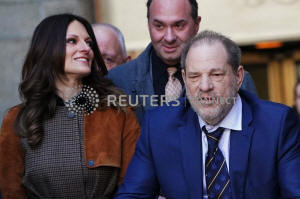Harvey Weinstein rape case may turn on history of prior 'bad acts'
 Send a link to a friend
Send a link to a friend
 [February 18, 2020]
By Brendan Pierson and Tom Hals [February 18, 2020]
By Brendan Pierson and Tom Hals
(Reuters) - A Manhattan jury's verdict in
the sexual assault trial of former Hollywood producer Harvey Weinstein
may well hang on the testimony of three women whose accusations were not
part of the underlying criminal case.
Deliberations were expected to begin on Tuesday in the case of
Weinstein, 67, who pleaded not guilty to sexually assaulting former
production assistant Mimi Haleyi and raping Jessica Mann, a onetime
aspiring actress.
During the six-week trial, the three other women - costume designer Dawn
Dunning, model Tarale Wulff and actress Lauren Young - testified they
were enticed into meeting Weinstein for professional reasons and then
groped or raped.
They testified about encounters separate from the crimes Weinstein was
accused of committing.
Prosecutors called the women as witnesses to try to establish
Weinstein's motive and a signature pattern of behavior that legal
experts described as potentially powerful evidence that might bolster
the claims of Haleyi and Mann.

“The volume and number of witnesses like that make it really difficult
for the defense to prevail,” said Daniel Hochheiser, a New York criminal
defense lawyer and former Bronx prosecutor.
New York law customarily prevents prosecutors from presenting testimony
of "prior bad acts," as it is generally considered prejudicial to a
defendant.
"You can't admit bad acts to show that this is the kind of person who
does this a lot, and so probably did it on this occasion," said Deborah
Tuerkheimer, a former Manhattan prosecutor who is now a professor at
Northwestern Law.
'SIGNATURE' PATTERN
An exception to the law allowed prosecutors to call Dunning, Wulff and
Young to show Weinstein "had a particular intention" or exhibited a
"signature" pattern of behavior when he invited women to meet and
discuss professional opportunities.
Under New York state law, such witnesses are known as "Molineux"
witnesses.
A lawyer for Weinstein, Arthur Aidala, said it was "extraordinary to
have three Molineux witnesses testify when there are only two
complaining witnesses."
"It is often difficult for prosecutors to convince a judge to allow one
Molineux witness," he said in an email.
Dunning testified that the producer groped her in 2004 and offered her
movie roles in exchange for three-way sex with him and his assistant,
which she refused.
[to top of second column]
|

Film producer Harvey Weinstein and lawyer Donna Rotunno depart New
York Criminal Court during his ongoing sexual assault trial in the
Manhattan borough of New York City, New York, U.S., February 14,
2020. REUTERS/Carlo Allegri

Young, a model and actress, testified that the film producer trapped
her in a hotel bathroom in 2013, masturbated in front of her while
groping her breasts, and told her: “This is what all the actresses
do to make it.”
On cross-examination, the defense challenged the women's
credibility. In Dunning's case, Weinstein's lawyers pressed her
about her decision to meet with Weinstein weeks after the alleged
assault and the fact that she did not tell anyone about the
encounter until years later.
But the sexual assault trial of comedian Bill Cosby suggests that
the impact of prior bad acts testimony can be tough for the defense
to overcome.
Pennsylvania prosecutors charged Cosby in December 2016 with a 2004
assault of Andrea Constand, a former Temple University
administrator.
About 50 women accused Cosby, now 82, of sexual assaults going back
decades. Cosby denied the accusations, insisting all the encounters
were consensual.
A first trial, with evidence from one "prior bad acts" witness,
ended with a deadlocked jury. A second trial included testimony from
five other women who accused Cosby of drugging and sexual assault,
even though some events occurred decades earlier and had no
connection to Constand.
A jury convicted Cosby in 2018, and he was sentenced to up to 10
years in prison. In January, Cosby asked Pennsylvania's highest
court to overturn the conviction.
Cosby's lawyers said in court papers that in the #MeToo era, "one
cannot imagine more prejudicial testimony" than a parade of women
testifying about sexual misconduct, which his lawyers said had no
connection to the crime.

"This also left him in the position of having six trials in one,"
they said.
(Reporting by Tom Hals in Wilmington, Delaware, and Brendan Pierson
in New York; Editing by Noeleen Walder and Howard Goller)
[© 2020 Thomson Reuters. All rights
reserved.] Copyright 2020 Reuters. All rights reserved. This material may not be published,
broadcast, rewritten or redistributed.
Thompson Reuters is solely responsible for this content. |